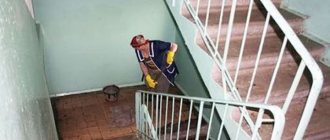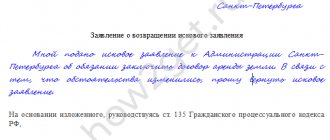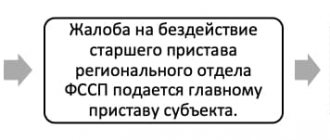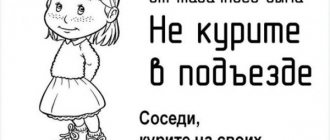Cleanliness requirements
Requirements for the cleanliness of common property are regulated at the Government level. The rules for maintaining housing and a list of steps to keep it clean are listed in Resolution No. 290 (last amended June 29, 2020).
The document contains a list of works (see paragraph 23) that need to be performed to maintain cleanliness:
- Wipe window grilles, handrails, window sills, correspondence boxes, doorways, meter cabinets.
- Clean corridors, elevators, stairs and interfloor areas.
- Carry out disinsection and deratization.
- Wash windows with water.
The frequency of cleaning is approved by Decree of the State Construction Committee No. 170 (clause 3. 2. 7.). Every five days, management companies must perform the following steps:
- Removing dust from floors, radiators, window sills.
- Washing the floor covering.
At least a couple of times in 12 months. Walls must be cleaned of dust. Wipe all surfaces at least once.
Regional authorities may apply internal standards for cleaning frequency . The approved frequency and list of maintenance work for common property can be seen in the agreement with the management company.
How to start cleaning porches yourself?
To refuse the service of maintaining common areas and decide to clean yourself, desire alone is not enough; you need to know some of the intricacies of the law. Let's introduce you.
Most likely, the topic of refusing to clean the housing department will be relevant in low-rise buildings, where residents often cleaned their staircases themselves. Now you can refuse the service, and therefore not pay for it. So, if you, as an initiative resident of the entrance (and you can be either the owner or the tenant!) decided to do this and know that your neighbors will support you, let’s arm ourselves with some knowledge.
Refusal to clean is regulated by clause 1.5. Decree No. 535 of December 31, 2015 “On the provision of housing and communal services” which states that consumers who own and (or) occupy residential and (or) non-residential premises located at the entrance of an apartment building have the right to refuse services for sanitary maintenance of auxiliary premises of a residential building, with the exception of services for disinfection, disinfestation, deratization, by concluding an additional agreement to the relevant contract and make a decision on their independent sanitary maintenance of auxiliary premises of an apartment building. The decision is made unanimously by consumers and is documented in the minutes of a meeting of consumers or the minutes of a written survey.
So, in order to refuse cleaning, you need to draw up minutes of the general meeting.
How to do it? There is no standard template for drawing up a protocol. It is drawn up in any form, but so that the housing office does not subsequently turn you around, pointing to the door, we will give an example of the most common form. In general, the preparation of protocols is regulated by the Law of the Republic of Belarus dated October 6, 1994 “On the National Archive Fund and Archives in the Republic of Belarus”, as well as the Ministry of Justice Resolution of January 19, 2009 No. 4 “Instructions for Office Work”, which establishes minimum mandatory requirements. If you want to be savvy in paperwork, you can check out these documents, they are publicly available on the Internet. To make your search easier, we will provide an approximate sample of the protocol, but first we will tell you what must be in it.
- Number of housing and communal services consumers who came to the meeting
- Agenda
- Solutions to issues
- Voting results
- Place and date of the meeting
In addition, participants must choose the chairman of the meeting and the secretary (by answering the question “Who is in favor?” - a simple vote), and they can also (but not necessarily) choose a counting commission.
Here is a sample minutes of the meeting:
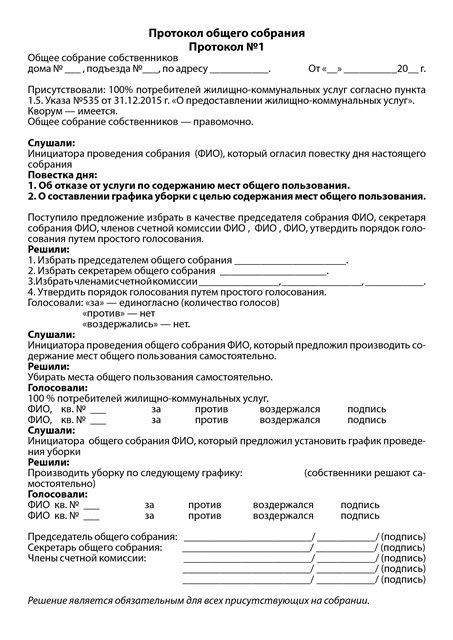
Here, many may have a question about who signs the protocol. Suppose there are 20 apartments in the entrance, somewhere 4 people are registered, and somewhere none. In some the owner lives, in others the tenant lives. In paragraph 1.5. It is clearly stated that housing and communal services consumers who own and (or) occupy residential and (or) non-residential premises can refuse cleaning. That is, the protocol must contain the votes of apartment owners or tenants of residential premises. At the same time, do not forget that personal accounts may be divided in one apartment; in this case, there may be more signatures, since an apartment may have several owners.
Please note that the second question in the protocol is the question of the schedule for cleaning entrances. Here, residents themselves have the right to decide and set the frequency. The minimum requirements are specified in Resolution No. 12 “On establishing lists of types of work for routine repairs of housing stock and the procedure for reimbursement of actual costs for routine repairs of housing stock,” and we wrote about this here.
After the protocol has been drawn up in accordance with the above requirements, it must be taken to the housing and communal services department (or to the municipal unitary enterprise “Housing and Public Utilities”).
Important: as explained by the Ministry of Housing and Communal Services, the Housing and Communal Services (or the Municipal Unitary Enterprise “Housing and Communal Services”) must accept the protocol without doubt, that is, without questioning the authenticity of the signatures and the protocol, if it (the protocol) is drawn up in accordance with the law. Also, the director of housing and communal services does not have the right to demand additional certificates, assurances and signatures of consumers of housing and communal services.
Anna DYAKOVA, magazine “Live Like a Boss”
23 Feb 2016
ADD A COMMENT
Who is responsible?
PP No. 290 states that the responsibility rests with legal entities that monitor the property by agreement with the owners.
In reality, the following organizations can clean staircases:
- developer;
- Management company, HOA or housing and communal services (the type of organization depends on the established form of management of the facility);
- cleaning companies hired by utilities.
The exact name of the legal entity obligated to keep the entrances clean can be found in the following documents:
- Agreement with the management company.
- A decision made by the owners at a meeting.
- Charter of the cooperative, comrade.
- Developer's decision.
You can find managers behind the house on the website dominfo.ru. A register of all housing service organizations is published on the portal.
What you can find out on dominfo.ru:
- what is the official name of the legal entity;
- what address is the office located at?
- how to contact representatives of the management company;
- what employees of the organization write in reports on the work done;
- what decisions were made at the meetings.
The information will be useful when preparing complaints. You can identify the organization responsible for cleanliness using a utility bill receipt.
Where to Complain About the Facade of a House
When damage occurs on the façade of a house, residents have a legitimate question about who should carry out the repairs and who will pay for them. This article will help you understand when there is a need for a major restoration of the facade, which is included in the repair of the facade of an apartment building. The implementation of repair and restoration work is regulated by the construction rules of SNIP and decisions of local executive bodies.
Large cracks in brickwork are not repaired with mortar, but bricks are replaced in the damaged area.
Facade repair technology (read more...)
Where to call, contact?
You need to contact the legal entities responsible for the situation, following the hierarchy.
Management of the management company
The appeal must be sent to the administration of the management company responsible for housing maintenance. The message must mention violations committed by the legal entity.
The message should mention that if there is no response, residents plan to send complaints to higher institutions.
Rospotrebnadzor

Employees of the authority must, on duty, supervise the management company. Rospotrebnadzor officials have the authority to solve such problems.
You can send a letter to the organization on the Rospotrebnadzor portal , through the “State Services” service. There is also a number by which officials receive requests (8-800-10-000-04).
You can call him at work. days from 10:00 to 17:00 (Moscow time). The telephone is unavailable between 12:00 and 12:45. Calls from the Russian Federation are accepted free of charge.
Housing Inspection (GZHI)
The organization is entrusted with the tasks of supervising the management company. You can send a complaint to the institution in three simple ways:
- On the Internet through the GIS Housing and Public Utilities portal, the website of the regional State Housing Institution (see in the search engine or 2GIS application).
- By mail to the address of the regional office of the State Housing Institute. You can clarify the recipient’s details on the inspection website, in the 2GIS help service.
- By phone. Contacts for communication are published in the 2GIS and Yandex.Maps applications.
You can also complain in person. The procedure, opening hours and address of meetings between representatives of the Civil Housing Inspectorate and citizens are published on the websites of regional authorities.
Regulations and frequency of work on cleaning the entrance
Maintaining common property in a satisfactory sanitary condition is the task of the management company.
According to current legislation, the following cleaning work must be performed in the entrances of apartment buildings:
- on landings and flights of the lower two floors - wet sweeping daily;
- above the second floor - wet sweeping twice a week when there is no elevator, once - if there is one;
- in areas in front of the loading valves of garbage chutes - wet sweeping daily;
- landings and flights of stairs - washing twice a month if the entrance is not equipped with an elevator, once - when there is one;
- elevator cabin – washed daily;
- walls, doors, lampshades and ceiling of the elevator car - wet wipe twice a month;
- windows - washed once a year;
- area in front of the entrance, metal grating and pit - cleaning and cleaning once a week;
- walls, doors, entrance lamps - wet wipe once a year;
- window sills and heating devices – wet wipe twice a year.
Separate standards apply to the cleaning of garbage chutes:
Dear readers! To solve your problem right now, get a free consultation
— contact the lawyer on duty in the online chat on the right or call: +7 (499) 938 6124 — Moscow and region.
+7 (812) 425 6761 — St. Petersburg and region. 8 (800) 350 8362 - Other regions of the Russian Federation You will not need to waste your time and nerves
- an experienced lawyer will solve all your problems!
- preventive examination - twice a month;
- removal of garbage from cells - daily;
- cleaning of cells - daily;
- cleaning loading valves - once a week;
- washing of replaceable waste bins - daily;
- washing the lower part of the barrel and gate - once a month;
- cleaning and disinfection of all barrel elements - once a month;
- disinfection of waste bins – once a month;
- removing blockages - if necessary.
How to prepare a complaint about poor cleaning?
The easiest way is to write an appeal in electronic format. The required fields will appear automatically when creating a letter. Organizations will not accept anonymous letters in electronic format (Clause 5, Article 18 of Federal Law No. 8).
When sending a letter, you must provide the following information:
- FULL NAME.,
- telephone,
- address.
There will be no response if the request has already been considered.
Letters to any institution must be clearly formulated. It is also necessary to indicate the laws that were violated and the date the message was sent.
Where else can you file a complaint?
Where can I file a complaint about repairs if the management company or the Fund do not respond? The next authority in the hierarchy is the State Housing Inspectorate, which is available in each region. The complaint is drawn up identically, but it is additionally worth mentioning that you have already contacted the repair customers, and they have not responded to your complaint.
An effective means when contacting the State Housing Inspectorate is to draw up a collective complaint that reflects the interest of the majority of residents of an apartment building.
Where else can I file a complaint about home renovations? The higher levels of the hierarchy are Rospotrebnadzor and the prosecutor's office. You can file a complaint against the capital repair fund with the prosecutor's office, and the application is considered within the framework of civil proceedings.
The prosecutor's office is the final authority for pre-trial proceedings. And when contacting the prosecutor’s office, as a rule, the application indicates a request to conduct a prosecutor’s inspection or restore (protect) the rights of citizen-residents of a particular apartment building.
Where to Complain About the Facade of a House
To send a letter via email, you must go to the page https://www.mos.ru/feedback/ and select one of the presented options for filing claims. Naturally, before writing your request, you need to log in to the Personal Account of the portal.
In addition to the Government reception, for questions related to the work of housing and communal services, you can contact the hotline of the Public Chamber of the Russian Federation:
If nothing helps, what to do? (read more…)
Legislative acts
You can enlist the support of other residents and make a collective complaint.
It is written in the same way as an individual address, with the exception of some points. According to Article 40 of the Government of the Russian Federation No. 491, owners of premises in apartment buildings have the right to conduct inspections of the volume, quality and frequency of work performed by the management organization. If deficiencies are identified during the examination, apartment owners, by law, can demand that the defects be eliminated from the persons responsible for this. Residents also have the right to receive all information about repairs and other work within 5 days from the date of application.
